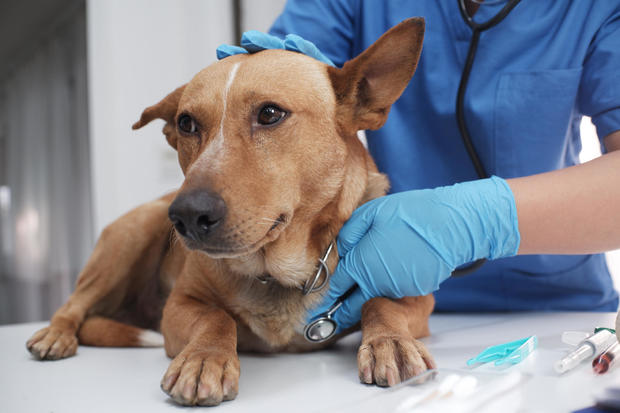Pet costs are high. Here's what owners can do about it.
When many people think of pet ownership, they understandably think of the fun parts: the long dog walks, playing with their new cat, the snacks and the hugs and kisses. But owning a pet, as joyous and as fulfilling as it often is, can also be expensive. And those expenses tend to remain high throughout the pet's full life.
The average price of having a dog is around $1,400 a year and is only slightly cheaper for cats (around $1,200), according to a newly published report. With many cats and dogs living to be 15 years old or longer, that can add up to significant sums of money. Fortunately, owners now have a cost-effective and valuable way to alleviate that financial burden: pet insurance.
In exchange for a modest fee paid to a provider (which is often discounted if paid annually), owners can secure coverage for a wide range of treatments, veterinarian visits and even some medications. Depending on the policy and provider, they can potentially get reimbursed for up to 90% of their medical costs.
If you think you could benefit from pet insurance then start by getting a free price quote here.
How pet insurance can help reduce costs
Pet insurance doesn't work exactly like health insurance for humans does. But that doesn't mean it's not valuable. Compared to the thousands of dollars owners are used to paying, a minimal fee of $70 or less each month (on average) could be well worth it. There are multiple types of pet insurance to choose from — and various deductibles owners can pick from. They can then proceed with their normal care routine, but instead of getting stuck with a hefty bill, with pet insurance, they can submit a claim to the company to get reimbursed for the money spent.
"Insurance helps cover the unanticipated costs of pet ownership and can be a huge relief for owners as they typically cover 80-90% of the costs, depending on the plan," Dr. Sarah Gorman, managing veterinarian at Small Door Veterinary in New York, previously told CBS News.
"Insurance helps us cover for the unexpected," Dr. Gorman continued. "Veterinarians don't love handing out big bills and we want our member's dollars to stretch as far as possible. By working with insurance companies this helps us provide a gold standard of care for our pet patients."
As with any financial product or service, however, it pays to shop around to find the best rates and terms. Interested owners can get a free pet insurance quote in 30 seconds here now or they can use the below table to shop and compare some top providers.
Pet insurance tips owners should know
Considering pet insurance now? Here are three tips all owners should know
- Prices will rise as your pet ages. A young pet is considered a healthy one, and the owners are less likely to submit claims to the provider, thus resulting in lower premiums the owner needs to pay. So don't wait to insure your pet. You'll only wind up getting stuck with a bigger bill.
- Pre-existing medical conditions won't be covered. Pet insurance providers can turn down coverage for pets who have these issues. This is another reason why it makes sense to buy pet insurance early. If you wait, and your pet develops these conditions, you'll be offered less coverage (at a higher price point) than if you had applied earlier.
- Different breeds come with different costs. While pet insurance is generally affordable, different cat and dog breeds will come with different costs. That could add up to significant sums over time, so if you don't have a pet yet but are considering buying or adopting one soon, make sure to do your research in advance so you know what pet insurance would cost for the considered breed.
The bottom line
With pet care costs high and no relief in sight, pet insurance can provide some much-needed financial relief. To get the most out of a plan, however, owners need to understand that prices will rise the later they wait in their pet's life to get a plan. And pre-existing medical conditions won't be covered, so it makes sense to get a policy in place before these issues arise. Finally, different breeds come with different costs. But if owners understand these three key factors, they'll best be prepared to secure a personalized and cost-effective pet insurance plan. And, more importantly, they'll start to reduce their overall pet care costs.




